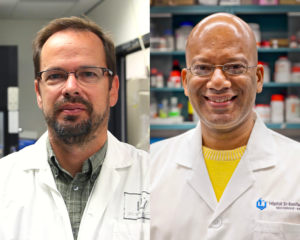Eating blackberries and black elderberries might protect your heart and prevent high blood pressure. That’s what Drs. Jeffrey Wigle and Thomas Netticadan of St. Boniface Hospital are working to prove.
“In nature, plants produce compounds called polyphenols when they are under stress,” explains Dr. Netticadan, Principal Investigator, Heart Failure Research Laboratory. “These polyphenols are very important for human health.”
Drs. Wigle and Netticadan are focusing their attention on cyanidin-3-glucoside, a polyphenol found in abundance in certain berries. The question they are trying to answer is whether cyanidin-3-glucoside, which exists to colour and protect plants, can also protect people. The results so far are very promising.
“For ages, plants have been the source of discovery.”
– Dr. Jeffrey Wigle, Principal Investigator, Vascular Development.
 Recently, Drs. Wigle and Netticadan have been trying to understand the chemical structures of cyanidin-3-glucoside and what therapeutic impact they could have in humans.
Recently, Drs. Wigle and Netticadan have been trying to understand the chemical structures of cyanidin-3-glucoside and what therapeutic impact they could have in humans.
In their first study, they discovered that, while cyanidin-3-glucoside does not lower blood pressure, it does seem to make the heart better perform and relax in someone who has very high blood pressure. It may also prevent moderately high blood pressure in the first place.
Their current study looks at the impact cyanidin-3-glucoside may have on patients who have already had a heart attack.
“The big goal, of course, is to find out whether there is some way to preserve heart muscle after an attack,” said Dr. Wigle. “We are so grateful that our donors understand our work. Without their support, we couldn’t move forward,” he said. “Their enthusiasm drives us.”
Your support moves science forward. You can help St. Boniface researchers make life-changing discoveries.


